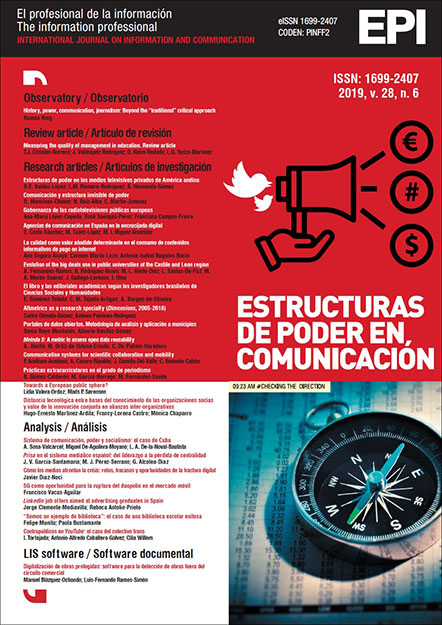
Título del artículo
Towards a European public sphere? A comparative study of the Facebook activities of Danish and Spanish members of the European Parliament
Autores/as
Lidia Valera Ordaz
Resumen
This comparative study examines the everyday Facebook activities of all Danish and Spanish members of the European Parliament (MEPs), and the extent to which there is a real political conversation between citizens and European representatives. Through content analysis, it analyzes the Facebook practices of a significantly under-studied population (MEPs) during a non-campaign period (January 15 to February 15, 2017) while most of recent research has overwhelmingly focused on campaign periods. The results show that both Danish and Spanish MEPs are generously present and active on Facebook, but that they are less popular than their national counterparts. The study shows that Danish MEPs use Facebook in a clearly more dialogue-oriented way than their Spanish colleagues. Their updates often lead to conversations between followers, and they frequently take part in these political discussions, while Spanish MEPs tend to limit their Facebook practices to content publication, avoiding citizen conversation.
Palabras clave
Facebook; Social media; Political communication; Political conversation; Public sphere; European Parliament; Political representatives; Citizens; Dialogue; Interactivity; Democratic deficit; Members of Parliament; MEP; Politicians; Denmark; Spain.
Publicación
El profesional de la información
Volumen
28
Número
6
Año
2019
Enlace de acceso al contenido
https://revista.profesionaldelainformacion.com/index.php/EPI/article/view/epi.2019.nov.11
REFERENCIA COMPLETA
Valera Ordaz, L.; Sørensen, Mads P. (2019). “Towards a European public sphere? A comparative study of the Facebook activities of Danish and Spanish members of the European Parliament”. El profesional de la información, v. 28, n. 6, e280511. DOI: https://doi.org/10.3145/epi.2019.nov.11
